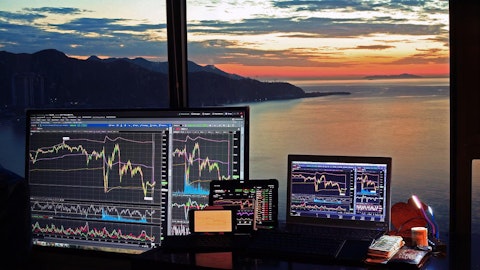In this article, we will be taking a look at the China’s real estate bubble and 5 other predictions that turned out to be wrong. To see more predictions, you can go directly to see the China’s Real Estate Bubble And 9 Other Predictions that Turned Out to be Wrong.
5. Jamie Dimon: Bitcoin Crash and Cryptocurrency Implosion
Prediction: 2017
Cryptocurrencies have always been extremely volatile, much to the concern of most investors and executives. In 2017, the emerging asset class would blow up as Bitcoin demand soared, seen as an alternative to the global financial sector. Digital currencies were seen as an emerging asset class ready to replace fiat currencies under governments’ control.
The hype around Bitcoin saw its price explode from less than $1,000 a coin to highs of $4,000. As the hype around Bitcoin soared, JPMorgan CEO Jamie Dimon joined the bandwagon, terming the flagship crypto a hyped fraud that was destined to implode to zero.
The prediction fell flat as the cryptocurrency rallied to record highs of $20,000 a coin in December of 2017. However, Dimon would be vindicated as the volatility finally caught up with the coin as it imploded, plunging by more than 80% to below the $4,000 a coin level in 2018.
The plunge once again underscored how unstable the digital asset is. Despite the implosion, the coin did bounce back, recouping all the losses and rallying to highs of $64,000 a coin in 2021. However, it has since pulled back, losing more than 50% in market value from all-time highs.
4. James Tudor: Market Crash Due to Trade Wars
Prediction: 2019
Donald Trump will go down in history as one of the US presidents who ramped up tensions between Washington and Beijing. At the peak of his tenure at the White House, Trump ramped up pressure on China, imposing significant tariffs as he sought to address a significant trade deficit between the two nations.
Trump ended up imposing billions of dollars on Chinese imports. China also hit back, imposing tariffs on US imports. The escalating trade war between the two economic powerhouses rattled the global financial sector, with US markets under immense pressure. There were concerns about the trade war, given that US exports to China support over 1.2 million American jobs. In addition, Chinese multinational companies employ over 190,000 Americans. Likewise, US companies invest over $100 billion in China.
In response to the trade war, Tudor warned of a potential market crash due to escalating tensions between the two nations. The hedge fund manager further claimed that the trade war could cause a global recession, a currency war, and the eventual collapse of corporate earnings.
The trade war had significant impacts, with the United States believed to have lost over 240,000 jobs as China imposed tariffs on imports. While President Joe Biden did not recede the tariffs imposed by his predecessors, their impacts appear to have been curtailed.
Despite the warnings by the billionaire investor, a full-blown market crash did not materialize. The US and China reached a partial deal in 2020 that eased some of the tariffs and tensions. The US economy has grown at an impressive rate, supported by other consumer spending and solid labor market conditions.
3. Ray Dalio: US Dollar Collapse
Prediction: 2020
In 2020, Veteran Hedge Fund Manager Ray Dalio warned that the US Dollars’ status as a global reserve currency was in danger. The prediction came amid the easy monetary policy taken by the US Federal Reserve to try and caution the economy amid the effects of the coronavirus.
The excessive money creation through stimulus packages and cutting interest rates to record lows prompted the hedge fund to predict the demise of the US dollar. Dalio also warned that growing economic and geopolitical rivalry with China posed a significant danger to the greenback. He also suggested that the US economy would face a depression-like scenario due to the pandemic, and businesses and consumers would feel the long-term impact.
The billionaire investor advised investors to diversify their portfolios with alternative assets like gold and cryptocurrencies that would benefit from the dollar’s collapse.
While the dollar has faced a string of headwinds, it remains the global reserve currency and has yet to experience a substantial decline in status value, as predicted by Dalio. The dollar index, which measures the greenback’s strength against the other major currencies, has fluctuated between $90 and 104 since 2020, affirming its status as the dominant currency for international trade finance and reserve. It also accounts for more than 60% of the global foreign exchange reserves.
2. Bill Ackman: Market Crash on Vaccine Rollout Failure
Prediction: 2020
Hedge fund mogul Bill Ackman made a bold bet that the rising number of COVID-19 cases would trigger a market crash in late 2020. The prediction came after the Pershing Square Hedge fund manager had made more than $2 billion earlier in the year on betting against the market less than a week after issuing a warning that “hell is coming.”
The $2 billion gain came as the market plunged in March of 2020 as the US was forced to go into lockdown as COVID-19 cases surged. The S&P 500 and Nasdaq 100 fell by double-digit percentages as fear rattled the market. Thereafter, Acman was a vocal critic of the US government’s handling of the pandemic, concerned by the delays in vaccine rollout needed to curtail the spread of the virus.
In November 2020, the hedge fund manager expressed his skepticism about the success of the COVID-19 rollout, suggesting logistical failures and delays. He raised concern that the economy would plunge further amid the lockdown measures. Acman ended up putting a new trade hedging against his equity exposure with insurance against corporate defaults as a hedge against a possible market crash.
Despite the concerns and hedges, the market never crashed as vaccination efforts proved largely successful in 2021. The US successfully vaccinated over 100 million people, with at least 75% of people having received at least one dose.
The US Federal Reserve cutting interest rates to record lows and issuing stimulus packages helped support the economy, triggering one of the biggest Bull Run. The US economy grew by 6.5% in the second quarter of 2021, with more than 4 million jobs created between January and August. The S&P 500 also rallied to record highs of 4,800. Therefore, Ackman predictions were only partially realized.
1. Pierre Andurand: Oil Prices Rally 2022
Prediction: 2022
Pierre Andurand is one oil trader who always seems to have an edge in predicting the direction oil prices are likely to go. The hedge fund manager specializes in trading oil and other commodities and is best known for his contrarian and bullish views on oil prices.
The hedge fund manager accurately predicted that oil prices will implode as the COVID 19 pandemic started causing havoc in China. In 2022 he would yet again be on the spotlight on predicting that oil prices will jump to an all-time high of $200 a barrel. The prediction came amid concerns that African members of OPEC and the US shale patch were struggling to replace the Russian crude that was going off market
Andurand also reiterated that even if Russia and Ukraine reached a cease fire Russian oil will not return and that oil prices would still go higher.
“I don’t think that suddenly they stop fighting, the oil comes back. It’s not going to be the case. The oil’s going to be gone for good,” Andurand told the Odd Lots podcast.
However, that was not the case as oil prices struggled to find support above the $100 a barrel level. After initially rising to highs of $120 a barrel, oil tumbled amid waning demand from China to close 2022 at lows of about $74 a barrel.
Insider Monkey focuses on uncovering the best investment ideas of hedge funds and insiders. Please subscribe to our free daily newsletter to get the latest investment ideas from hedge funds’ investor letters by entering your email address below. You can also check out our articles on Long-Term Returns of Billionaire Barry Rosenstein’s Activist Targets and Long-Term Returns of Scott Ferguson Activist Targets.





